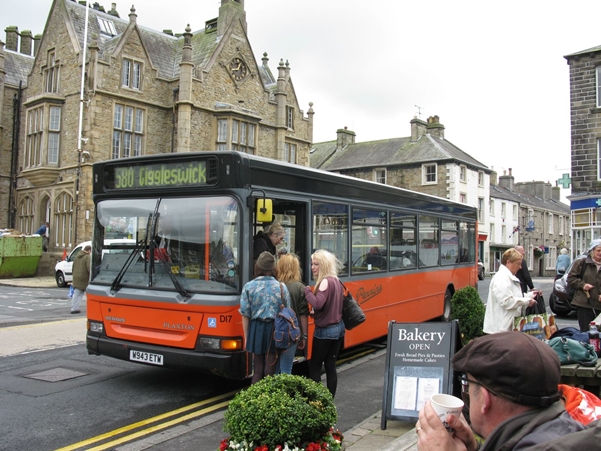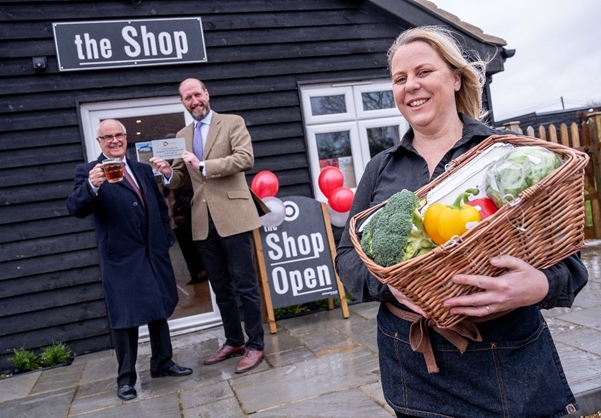T: 01822 851370 E: [email protected]
Visit RSN Survey about life in rural England to find out more.
Spotlight on the RSP - April 19 Edition
Welcome to April’s Rural Services Partnership Spotlight of 2019. We are thrilled by the ever-increasing interest in the Rural Services Partnership (RSP) and the variety of organisations that have joined in recent months.
Since RSP members were given the opportunity to join both the RSP and the Rural Health & Care Alliance, which has been established by the Rural Services Network (RSN) and National Centre for Rural Health & Care (NCRHC). The RSP has increased its membership to over 170 organisations. To find out more about these and existing members of the RSP click here
This month we have been overwhelmed with examples of good practice, press releases and updates from our RSP members about their organisations. Take a look at the following:
Working with The Campaign for Better Transport
The RSP is proud to be working with Darren Shirley, Chief Executive, Campaign for Better Transport.
 The Campaign for Better Transport has produced some recent research which states that rural public transport across the UK is getting worse, read on to find out more….
The Campaign for Better Transport has produced some recent research which states that rural public transport across the UK is getting worse, read on to find out more….
Our research on local bus services has shown that across much of rural UK, public transport is poor and getting worse. Sending the occasional bus on circuitous routes around far apart villages was never a particularly attractive proposition to passengers or policy makers. Add in a decade of year-on-year cuts to local authority supported bus services, and you have a recipe for the wholesale loss of connections to entire rural communities.
But accessible and affordable public transport is as important in rural areas as anywhere else. If there's no bus, then those without a car, typically older people, younger people and those on low incomes, find themselves stranded and isolated. Buses connect people to jobs, health services, education, shops and leisure facilities, not to mention enabling people to visit friends and family. When a bus service disappears, so does a person’s and a community’s link to the outside world. Even those who can drive are finding themselves on increasingly congested roads with the associated air pollution increased car use is causing.
Poor transport affects rural economies too, stunting growth and limiting business and job opportunities. Without good transport connections local businesses, especially in rural areas, suffer especially retailers in villages and towns.
A community transport driver in rural Suffolk told us that he often picks up passengers who have not left their house in months due to bad weather or lack of public transport. One parent told us that since their village bus services ended her children are no longer able to meet friends at the weekend or take part in out of school activities, which understandably has a huge impact on their confidence and self-esteem.
Whilst there is widespread recognition that rural public transport is vital and needs to be improved, there has been little national leadership or support to achieve this. Despite some success stories, overall there is a patchwork of provision that has developed with little or no coordination. We also fail to harness the benefits from public funding of transport for patients or schools. It is possible to link up services and procurement across a local area to provide passenger transport alongside that for schools and patients too.
It’s clear that things need to change. In our recent report, The future of rural bus services in the UK, we looked at how we can turn the tide of cut off communities and make sure rural communities stay accessible for everyone.
Our research showed that creating comprehensive and consistent networks in rural areas can be achieved if we pool resources and involve communities in planning. As a basis, this should include:
- Buses and local rail services that connect with each other
- More 'demand responsive' services with flexible routes in areas with less demand
- Community-based transport, like taxis and minibuses, as part of the public transport network
- Using technology to provide access to information transport where and when people need it, and make it easier for people to book and choose
- Examining how car clubs, bike hire schemes and ‘mobility as a service’, which lets people plan and book journeys involving multiple transport modes in one go, might be used in rural areas
There is an opportunity to rethink rural public transport and ensure all communities have a genuine choice about how they travel.

Read The future of rural bus services in the UK on our website at www.bettertransport.org.uk/ruralbuses
Working with Pub is the Hub
The RSP continues to recognise the exceptional work of its members, in particular that of the Pub is the Hub and its launch last month of a new shop at The Lodge at North Tuddenham, Norfolk.
Last orders for a loaf of bread!
 The Lodge at North Tuddenham expands into retail
The Lodge at North Tuddenham expands into retail
A new shop at The Lodge pub at North Tuddenham was officially opened recently by Norfolk County Councillor, Bill Borrett.
The shop has been opened in the pub by licensees, Vikki and Gavin Hunt, with support and advice from rural pub champions, Pub is The Hub, and a grant of £3,000 from Norfolk County Council’s Community Services Fund
Cllr Bill Borrett, Norfolk County Councillor for North Tuddenham, said: "I am really excited by this project, and very pleased that Norfolk County Council is able to help fund it. The community shop is much needed in North Tuddenham and it will also contribute to our aims of helping to reduce isolation in communities and enabling people to remain independent for as long as possible."
Vikki and Martin have been running The Lodge since 2007 and, following an extension and refurbishment project in 2017, they realised that they finally had room to accommodate the shop that they had always wanted to provide for the village. They made contact with Pub is The Hub for advice and, through the local advisor, Terry Stork, were awarded the £3,000 grant from Norfolk County Council’s Community Services Fund towards the cost of the shop fittings.
The shop will sell locally sourced fruit, vegetables, dairy, meats, take away coffees and ready-made Indian meals as well as everyday essentials and will be open for pub opening hours; from 12 midday to 11pm on Tuesday to Sunday. Initially the shop will be available from an entrance in the pub but it also has a separate accessible entrance from the car park and Vikki hopes to create some new part-time work if the shop becomes busy.
Vikki said: “We are enormously grateful to Pub is The Hub for the advice and support they have given and to Norfolk County Council for financial support with the grant to help towards the costs. The shop will save locals an 8-mile round trip to the nearest shop as well as the chance to pick up a loaf of bread up to 11pm at night!”
Terry Stork from Pub is The Hub added: “In a rural area this sort of enterprise is a much needed and welcome asset for North Tuddenham. With thanks as always to Norfolk County Council for their foresight in supporting rural services with the grant towards this project.”

→ https://thelodge-tuddenham.co.uk/
→ https://www.pubisthehub.org.uk/
For more information contact:
Lisa Harlow at Pub is The Hub on 07917 757860 and [email protected]
Working with Outside The Box
The RSP has been working with Outside The Box for over a year now and is keen to promote their work which addresses rural loneliness and social isolation in both England, Scotland and Wales. Take a look at their innovative project Rural Wisdom.
 Outside The Box was pleased to welcome the Scottish Government’s publication of ‘A Connected Scotland ‘- its “strategy for tackling social isolation and loneliness and building stronger social connections”. This ‘world-leading strategy’ aims at building stronger social connections.
Outside The Box was pleased to welcome the Scottish Government’s publication of ‘A Connected Scotland ‘- its “strategy for tackling social isolation and loneliness and building stronger social connections”. This ‘world-leading strategy’ aims at building stronger social connections.
Making connections is key to the work we do at Outside The Box, in helping to build stronger, more inclusive communities.
The latest video highlighting the work of our Rural Wisdom project focuses on ‘Bringing People Together’ and can be seen here:
or on our blog: http://otbds.org/what-makes-rural-wisdom-bringing-people-together/
Speaking in the video, our development workers found that sometimes the first step is just simply getting people in the same room. By creating spaces that enable conversations we can help join the dots in a community – perhaps between someone with an idea, and someone else who has the resources to facilitate it.
They also bring people together on a wider scale, stating that when a rural community starts to connect with one another, that’s when it can take ownership and start shaping local services and activities to better suit local needs.
Rural Wisdom has also helped to foster inter-generational connections. In Eaglesham, the connections made between a school and an older people’s home has had a big impact on all those involved.
Finally, by connecting rural communities in Scotland with those in Wales, we are able to learn from each other, share knowledge and help improve things for rural communities on a national scale. By enabling connections, we become something bigger than ourselves and can feed shared learning into policy formation.
To find out more about the work of Outside The Box visit their website: https://otbds.org/
Working with The Arts Council
The RSP is proud to be working with Paul Bristow, Director, Strategic Partnerships, Arts Council, England. To find out more about the Work of the Arts Council, please read on….
The Power of Data
 No matter where you live, everyone should have cultural opportunities. The Arts Council works across the country with partners to make this aspiration a reality.
No matter where you live, everyone should have cultural opportunities. The Arts Council works across the country with partners to make this aspiration a reality.
Between 2018 and 2022, we will invest £1.45 billion of public money from government and an estimated £860 million from the National Lottery in places across the country to help us achieve that.
We pride ourselves on being an intelligent investor. That means really getting to grips with places and communities across England. Their differing needs and strengths.
For example, a fifth of our population live in rural areas. Clearly, they deserve quality cultural experiences. So, to help ensure they get them we look carefully at the challenges and opportunities cultural organisations and creatives in those communities’ face. While rural areas have much in common, no two places are alike. We set out how we would seek to work in rural areas in 2014, and we’ll be updating that in the coming weeks[1].
A first step is to make sure we’re listening to and learning from people in rural communities. One of the ways we do this is consulting with our Rural Stakeholders Group. Its membership is drawn from rural cultural organisations, local government and stakeholders such as ACRE and national parks. The group provides us with honest and practical feedback on our priorities and plans. Helping us think more clearly about the issues we need to address.
We also try to get the best data and intelligence to inform our decisions. In 2015 we published our first Rural Evidence and Data Review[2]. Putting in one place the key information about culture in rural areas. The analysis was informed by a steering group of experienced rural cultural leaders, along with Defra research specialists.
In the next few weeks we’ll be publishing an updated and revised Rural Evidence and Data review. It sheds light on some important points.
- Declining investment from local government in arts and culture is a particular problem in rural areas. Between 2010/11 and 2016/17 it fell by 27% with investment in the most rural areas falling by 33%.
- 5% of our National Portfolio Organisations are based in rural locations.
- 11% of successful applicants to our Grants for the Arts programme between 2014/15 and 2016/17 were based in rural areas, receiving 10% per cent of funding.
- Despite this however, people living in rural areas are still engaging with culture more than those in urban areas. The relationship between rural areas and urban areas is clearly important – not just our great cities but our market towns and smaller cities are vital to cultural opportunity across wide geographies.
- Arts Council programmes are having an impact in rural areas. A third of Creative People and Places projects are based in rural areas. These projects invest in communities where engagement is currently low. While a quarter of investments from our tourism programme, Cultural Destinations, are made in rural places.
- Touring also remains vital to rural communities. 18% of performances from our Strategic Touring Programme were in rural locations in its fourth year of operation.
- While deprivation is higher in urban areas, there are particular challenges relating to social mobility in rural areas - and there are pressures of an ageing rural population. The Arts Council will need to consider the implications of rural social and economic change as we make our decisions.
The Rural Data and Evidence Review will help us develop our approach to ensuring cultural opportunity in rural communities. It’s going to be key input to the development of the Arts Council’s new ten-year strategy, which will be in place from 2020 to 2030. We hope it will help our partners as well – in national and local government, in national parks, AONBs, in business and in the voluntary sector.
So, plenty to consider, but also a lot to be proud of. Our rural communities have high levels of cultural engagement. They boast world class cultural institutions like the Yorkshire Sculpture Park and Snape Maltings. While the reach of rural touring into communities up and down the country is helping to keep culture in rural England strong. This in turn helps build successful and prosperous rural places.
That’s why culture needs to be at the heart of everyone’s vision for rural England. Our new Rural Evidence and Data Review will help achieve that.
[1] https://www.artscouncil.org.uk/community-and-place/rural-positioning
[2] https://www.artscouncil.org.uk/community-and-place/rural-evidence-and-data-review
Dates for your diary
As RSP members you have more opportunities than ever to network and learn from best practice, as we continue to provide a diverse and exciting programme of events. These include:
- Tuesday 3rd and Wednesday 4th September The National Rural Conference: RSP delegates benefit from reduced admission rates
- The regional seminars/networking meetingsaround the country on key rural topics. A really great opportunity to network with likeminded rural services professionals. The seminars are free for RSP members and the remaining dates for the 2019/2020:
North East – Topic, Sustainable Rural Communities, the 3rd or 4th June
East Midlands – Topic, Rural Health & Wellbeing 8th July
North West –Topic, Delivering Services Differently 22nd or 25th October
Yorkshire and Humberside – Topic, Barriers to Access 19th December
- Tuesday 19th November Rural Services Partnership meeting aimed at bringing together non-public sector organisations to network and share best practice on service delivery in rural areas. The meeting details will be circulated in due course.
And don’t forget we are asking all of our members to sign up to the campaign 'Time for a Rural Strategy'. If you have not done so already, please sign up and back the campaign by accessing the following link: https://www.rsnonline.org.uk/time-for-a-rural-strategy
Please could you forward the link as widely as possible within your networks and key rural organisations and encourage them to sign up to our call and help us with the campaign. Signatories won't be agreeing to everything in the 'It’s Time for a Rural Strategy' document; just the call on Government.
Promoting Rural Best Practice
 Many of our members are keen to tell you more about their organisation’s excellent work and with this in mind we have developed a unique area on our website as a resource for them to do so. This can be found here.
Many of our members are keen to tell you more about their organisation’s excellent work and with this in mind we have developed a unique area on our website as a resource for them to do so. This can be found here.
Equally, the RSP are keen to provide opportunities for RSP members to promote their work to the wider RSN network of 25,000, which includes over 140 LAs, community organisations, rural businesses, and parish councils, to mention but a few. Members can send through this information by emailing Jon Turner.
Why Not Join Up!The RSP exists to enable the issues facing the rural areas of England to be identified, information and good practice to be shared and government to be challenged to address the needs and build on the opportunities which abound in rural areas. If you know a rural organisation that would benefit from membership, please ask them to consider joining us. The RSP is a solely rural focused organisation with an electronic distribution network in excess of 25,000 individuals. We reach all sectors of rural England and provide a sustained and respected voice for rural areas at national level. Anyone who wants to talk to us about our role and services of the RSP please take a look at the link https://www.rsnonline.org.uk/page/about-the-rsp or contact Jon Turner to find out more. |




